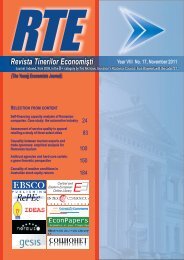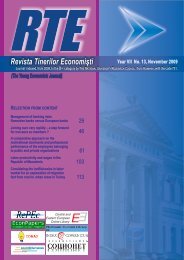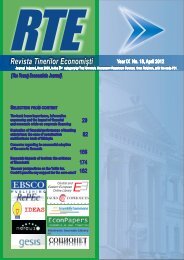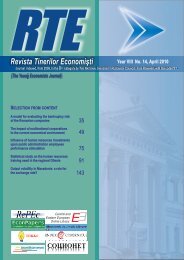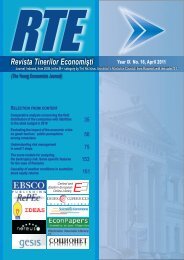Implications of change management in public administration
Implications of change management in public administration
Implications of change management in public administration
Create successful ePaper yourself
Turn your PDF publications into a flip-book with our unique Google optimized e-Paper software.
103<br />
Management – Market<strong>in</strong>g - Tourism<br />
We are also <strong>in</strong>terested <strong>in</strong> analyz<strong>in</strong>g the aspect <strong>of</strong> the Romanian employee and <strong>in</strong><br />
expla<strong>in</strong><strong>in</strong>g the quasi-absence <strong>of</strong> group decisions with<strong>in</strong> the Romanian SMEs. The<br />
psychologist Ion Bucur makes a tough description <strong>of</strong> this aspect: “The more distant<br />
from a leadership position the Romanian employee is, the lesser they identify with the<br />
objectives <strong>of</strong> the organization. The lower he is <strong>in</strong> the company hierarchy, the lower is<br />
his motivation.” The same expert, after realiz<strong>in</strong>g a study about motivation, <strong>in</strong> a number<br />
<strong>of</strong> sales companies, identified the follow<strong>in</strong>g elements: the motivation <strong>of</strong> avoid<strong>in</strong>g the<br />
failure prevails – 80%; adaptive, conservative persons prevail – 80%; good executers<br />
prevail – 95%; pragmatic, shot-term oriented person prevail – 80%; defensive attitudes<br />
prevail – 70%; the adaptation motivation prevails despite the motivation regard<strong>in</strong>g<br />
<strong>change</strong> motivation – 75% (www.wall-street.ro).<br />
Such attitudes might have older causes (deep-rooted mentalities) but the<br />
behavior <strong>of</strong> the owner-manager may also be a tripp<strong>in</strong>g factor.<br />
In what follows we will present another relevant example regard<strong>in</strong>g Romanian<br />
entrepreneur‟s mentality and the manner <strong>in</strong> which they understand to <strong>in</strong>volve their<br />
employees <strong>in</strong> the decisional process.<br />
Radu Timis is the owner <strong>of</strong> Cristim (an important player on the Romanian<br />
market <strong>of</strong> cold meats), a bus<strong>in</strong>ess <strong>of</strong> 120 million and over 2000 employees (is not<br />
anymore a small or medium bus<strong>in</strong>ess, but elements that will be presented overlap up to<br />
the theoretical elements presented by Torres). In 2005 he separated from the company<br />
<strong>management</strong> return<strong>in</strong>g <strong>in</strong> 2009 (“economic recession forced us to open our eyes”). This<br />
<strong>in</strong>terval was characterized by repeated <strong>change</strong>s at the <strong>management</strong> level. The reasons <strong>of</strong><br />
this fact are presented below, <strong>in</strong> the words <strong>of</strong> the entrepreneur:<br />
“Because they did not adapt to the vision, the ideas, the rhythm and the<br />
CrisTim company style, we weren‟t able to rema<strong>in</strong> together. They did not believe <strong>in</strong> my<br />
vision <strong>of</strong> a 40% growth annually. That is why, at present we work only with the second<br />
echelon.” (www.zf.ro)<br />
“I consider that it is still dangerous that people <strong>in</strong> a company wait for a decision<br />
and do not action <strong>in</strong> this respect. And here I refer to all levels. For dour years any<br />
decision had had to reach the CEO who analyzed it and decide whether was good or<br />
bad. Noth<strong>in</strong>g was delegated. Actually, I gave more freedom than the freedom given<br />
after I left the executive. This my first reproach: lack <strong>of</strong> delegation. People got used to<br />
that and now I have to break them <strong>of</strong> this habit. I say to them: “Is it good what you want<br />
to do If you th<strong>in</strong>k it is, go for it. We will analyze the results after month and we will<br />
see whether was good or not.” (http://moneyexpress.money.ro)<br />
“A fantastic th<strong>in</strong>g happened: my „third eye‟ opened. Now, I see all th<strong>in</strong>gs „just<br />
<strong>in</strong> time‟. For any problem which may occur, I have the solution immediately; I know<br />
what I have to do. I am the one who knows best the bus<strong>in</strong>ess I run. A manager is<br />
noth<strong>in</strong>g but an employee who risks los<strong>in</strong>g his bonus if he makes the wrong decision,<br />
while I risk to lose the bus<strong>in</strong>ess and to affect, <strong>in</strong> this way, the jobs <strong>of</strong> 2000 people.”<br />
(http://moneyexpress.money.ro)<br />
Are we talk<strong>in</strong>g aga<strong>in</strong> about a phenomenon specific to Romania It may be<br />
exaggerated but not specific. The specialized literature is our witness <strong>in</strong> this respect. For<br />
the majority <strong>of</strong> the first-generation firms a centralized decisional process, dom<strong>in</strong>ated by<br />
the founder is specific (Alderson 2009). The second generation <strong>of</strong> entrepreneurs may<br />
become more collaborative under the <strong>in</strong>fluence <strong>of</strong> the family pressure and conflicts, but<br />
also because <strong>of</strong> the lack <strong>of</strong> experience and even competence, or because <strong>of</strong> the fear <strong>of</strong><br />
failure.



